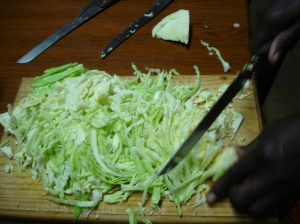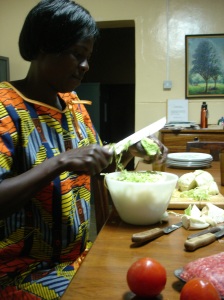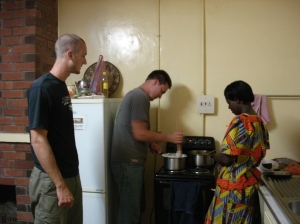The power was out this afternoon when I got home from church. I did not immediately notice this fact for two reasons: one, at 13 hours the natural sunlight is perfectly sufficient for lighting needs, and two, my neighbor Moses was watching a medical drama on his computer, so the building was hardly devoid of mechanical noises. It came back again before I had to lunch on sunlight-thawed frozen leftovers (I wasn’t trying to freeze the rice, but I did want to make sure that the sausage stayed frozen while I was in Choma last week, with the result that I accidentally froze just about everything in the fridge), which I was quite pleased about. The power went out again while I was showering, or possibly before that, while I was doing my laundry (I didn’t notice for much the same reasons as the first time), and I think it was very decent of it to allow me to make lunch. Here’s hoping for supper.
I spent four days in Choma last week learning Tonga. I have decided that the most difficult thing about Tonga (at least initially), aside from a total lack of cognates and commonality to English or Germanic or Romance languages, is that the consonants are not the same. They may look the same when written down, but it seems to me to be a convention generally agreed upon that sounds that are not really present in the English language will be represented by certain letters. K, for example, is rather more like G than like K, although softer than actual G (which is also present), so that the word kwena (nothing) is said more like ‘gwena’ than like ‘kwena,’ though not as forcefully as the name Gwen. Except for the occasions when it isn’t; I’m pretty sure that ndakuta (I am full/satisfied) is ‘dakuta,’ not ‘daguta.’ There’s also the sound that I’ve been calling ‘nyah’ in my head. No one seems to agree on how to spell this one, though the book we’ve been using most seems to use ng’, as in ng’anda, home. One of the other books says that it’s like the first N in ‘onion,’ which is sort-of is, but it’s more nasal than that, and it hangs longer.
There’s no distinction in Tonga between the letters L and R. It’s all written L, but in speech it may range anywhere between the two, and won’t necessarily be the same for two instances of the same word. (This carries over into English, too, so that Chris is as likely to be ‘Chlis’ as ‘Chris.’ No one’s tried to call me Miliam, though.) And B is a much softer sound than in English; like a Spanish B, it’s very close to V. At least for this one, I have practice in softening my Bs. And then there’s C, which is pronounced more like J, or perhaps Y, except for certain situations in which it’s CH, which possibly happens when it follows N? So the word cuuno, stool, I want to spell ‘juno,’ but with a soft j.
The other thing that’s difficult about Tonga is that there are different classes (‘modes’?) of nouns. I haven’t even been able to figure out if we’re declining them, or if they’re like gendered nouns, only there are too many genders, or what. But things change based on what noun you’re using, and I never know how. Luckily for me, I understand this so incompletely that it is not yet troubling me at all.
In good news, so far as I can tell, Tonga doesn’t conjugate verbs at all, just sticks extra little words in to indicate past or future, and adds a pronoun-prefix to indicate the subject (ndalumba is ‘I am thankful,’ and twalumba is ‘We are thankful’). And I don’t have to learn numbers, because Tonga only has numbers up to five, so everyone just uses English numbers.
Our lessons included cultural content in addition to just language.
We also made nsima (‘shima’), cornmeal dough. It’s white, and thicker than cornmeal mush (though also smoother), and the flavor is similar, but not as pronounced.
All in all, we had a good time, and I look forward to more lessons with Maureen over the next few months. I had minor adventures on the minibus getting back to Macha (seventeen people in a van with five rows of seats!), but there is not a permanent ridge in my legs, the mysterious greasy smear wore off, and the utter destruction of my new canvas recycled plastic bottle bag was not more than a minor inconvenience, the milk did not leak too badly, and was not sour when I got home.
In culinary adventures, I made yogurt last night, and I have five avocados that I saw on the tree.




Good to read of your days! Makes me aware that we take things for granted- like consistent electricity. Thinking of you! Dottie
Jealous of the avocados fresh from the tree! Are they the little black-skinned ones of the big green-skinned ones? Or can you get both there?
How did the yogurt turn out? How did you end up keeping it warm while it yogurt-ified?
They’re big black-skinned ones (though the really big green-skinned ones are also available here; someone has one sitting in the cupboard over the sink). I ate some of one for lunch today. It wasn’t really ripe, but half of it was rotten, so the not-rotten part needs to be eaten.
The yogurt turned out great! It’s a little runnier than commercial yogurt, like you said, but still plenty thick. I left it overnight in the hot/cold bag that I use for grocery shopping.
I think Moses doesn’t know what to make of me sometimes, but I get that at home on occasion, too, so I’m used to it.
I understand about having others not know what to make of you…I feel that all the time, too. Moses will adjust!
It sounds like you are doing lots of interesting things. Have you seen any animals (other than the rat)? I’m adopting two pet rats on Saturday. Talk about weird–most people go, “Ewwww. A rat? Gross.”
What have you resolved about the late night dental issue? I think of you every time I brush my teeth in the kitchen sink.
It is fun reading about your adventures.
tmg
I’ve seen a lot of birds, and there is an entire tribe of orange tabby cats wandering around. Fluffy is the one who hangs out around the wooden house, and Boya (means furry in Tonga?) and another one live at the school, and the pilot and his wife have the cat who survived getting caught in the car engine last week, and also a dog. There are cows that wander around in front of my house and around my work (and one of these days I will have my camera with and take a picture). I’ve seen chickens, though thankfully the nearest flock is far enough away that I don’t hear roosters all night, and any number of interesting wild birds. AND last week in Choma, I’m pretty sure I saw a mongoose — slender mongoose is what looks most like it, according to the pilot’s wife’s animal book.
I’ve been brushing my teeth in the washhouse. Lately it’s more been adventures in washing teeth with no running water, since today is the third straight day when the water stops coming out of the tap sometime midafternoon. I’m hopeful that this is not a feature of hot season, but I realized today that when we run out of water, the outside pump behind the house still has (Moses says because it has lower elevation), so I can get more if I empty my big red bucket.